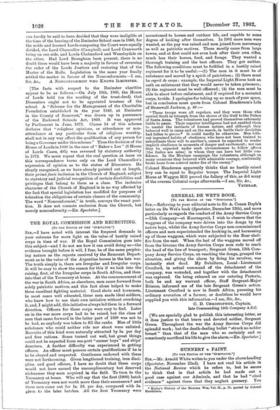THE ROYAL COMMISSION AND RECRUITING.
[TO THE EDITOR OF THE "SPECTATOR.")
have noted with interest the frequent demands in your columns for more light on the value of hastily raised corps in time of war. If the Royal Commission goes into this subject—and I do not see how it can avoid doing so—the evidence brought before it will, I fear, be of the same perplex- ing nature as the reports received by the Remount Depart- ment as to the value of the Argentine horses in the late war. The truth simply is, there are Irregular and Irregular corps. It will be easy to show the reason for this if we look into the raising, first, of the Irregular corps in South Africa, and then into that of the Yeomanry at home. At the commencement of the war in South Africa, as elsewhere, men came forward from solely patriotic motives, and this fact alone helped to make them excellent fighting material. Good shots and horsemen, in most cases well educated, these men made ideal soldiers, who knew how to use their own initiative without overdoing it, and, I might add, this initiative always led them in a forward direction. Officers for these corps were easy to find. Later on in the war more corps had to be raised, but the class of men that came forward in the latter part of 1899 was not to be had, so anybody was taken to fill the ranks. Men of little substance who could neither ride nor shoot were enlisted. Recruits of this kind were naturally attracted by 5s. per day and free rations. Some turned out well, but great things could not be expected from sea-port "corner boys" and ships' deserters. A further difficulty was experienced in getting officers. An officer must possess certain qualifications if be is to be obeyed and respected. Gentlemen endowed with these were not forthcoming. Given lengthened training, iron disci- pline, and good officers, I have no doubt that these corps would not have earned the uncomplimentary but deserved nicknames they soon acquired in the field. To turn to the Yeomanry at home. Who will say that the first (1900) batch of Yeomanry were not worth more than their successors ? and
these men came out for is. 3d. per day, compared with 5s. given to the later batches. All the first Yeomanry were Henir accustomed to horses and outdoor life, and capable to some degree of looking after themselves. In 1901 more men were wanted, so the pay was raised and men joined from mercenary as well as patriotic motives. These mostly came from large towns, and at first could not even look after their own rifles, much less their horses, food, and forage. They wanted a thorough training and the best officers. They got neither. The following conditions must be fulfilled in a hastily raised regiment for it to be useful :—(1) The men in it must be of substance and moved by a spirit of patriotism; (2) there must be esprit de corps : example, the Imperial Light Horse took an oath on enlistment that they would never be taken prisoners; (3) the regiment must be well officered; (4) the men must be able to shoot before enlistment, and if required for a mounted corps, to ride. I apologise for taking up so much of your space, but in conclusion must quote from Colonel Henderson's Life of Stonewall Jackson, p. 49 :— " These troops were all regulars, and they were those who carried Scott in triumph from the shores of the Gulf to the Palace of Santa Anna. The volunteers had proved themselves extremely liable to panic. Their superior intelligence had not enabled them to master the instincts of human nature, and although they behaved well in camp and on the march, in battle their discipline had fallen to pieces.* It could hardly be otherwise. Men with- out ingrained habits of obedience, who have not been trained to subordinate their will to another's, cannot be expected to render implicit obedience in moments of danger and excitement; nor can they be expected under such circumstances to follow officers [the italics are mine] in whom they can have but little con- fidence. In the Mexican campaign the volunteers, although on many occasions they behaved with admirable courage, continually broke loose from control under fire of the enemy."
Colonel Henderson apparently thinks that no hastily raised levy can be equal to Regular troops. The Imperial Light Horse at Waggon Hill proved the fallacy of this, as did many of the oversea Colonial corps afterwards.—I am, Sir, &c.,
VETERAN.






































 Previous page
Previous page